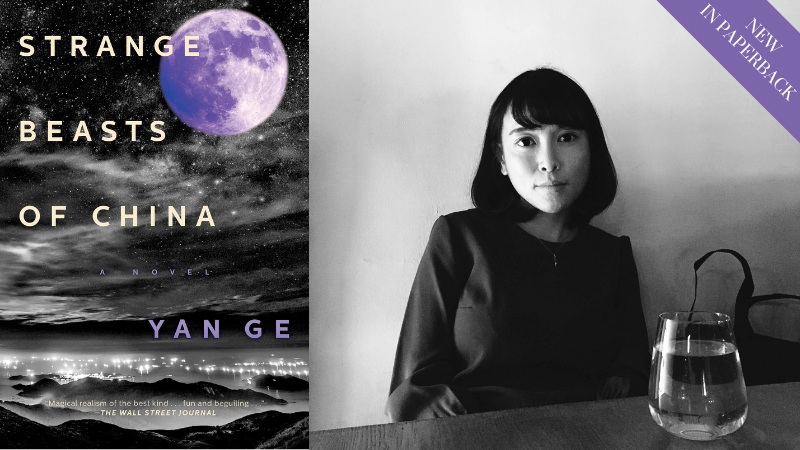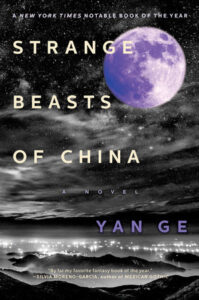
Welcome to the Book Marks Questionnaire, where we ask authors questions about the books that have shaped them.
This week, we spoke to the author of Strange Beasts of China (out now in paperback), Yan Ge.
*
Book Marks: Favorite re-read?
Yan Ge: Every time I finish a big project—usually a novel—I go back to read Anna Karenina. For reasons unclear to me, I find re-reading Anna Karenina extremely therapeutic, and it always helps me to get through my unmitigated sense of emptiness after giving birth to a book.
BM: A book that blew your mind?
YG: A small book by Jacques Ranciére, The Aesthetic Unconscious. I first read it about ten years ago in one sitting and I still remember the way my head span when I finished the last page—it almost felt like a psychedelic experience. This book also got me into reading theory books.
BM: Last book you read?
YG: Family Lexicon by Natalia Ginzburg, translated by Jenny McPhee. Ginzburg wrote the book when she was living in London in the 60s, homesick for her Italian family. Having not seen my family in China since 2019, I cried a lot reading this book and really savoured it, trying my best to not finish it.
BM: A book that made you cry?
YG: I cry often when reading books. A few months ago, I had to go to A&E for some health issue. And as it happens, nobody there was able to say my name. After being called ‘hey’ or ‘you’ a number of times, I was sitting in the corridor, waiting, when I began to read a small book I’d brought: Audre Lorde’s The Master’s Tools Will Never Dismantle the Master’s House from the Penguin Modern collection—and this book made me cry.
BM: What book from the past year would you like to give a shout-out to?
YG: I feel there’s little necessity for me to mention this book as I believe everyone would have heard of, if not already read, this brilliant novel. But I need to express that I absolutely loved No One is Talking about This by Patricia Lockwood. In fact, I haven’t loved a book so intensely for years and it made me feel incredibly alive.
BM: What’s one book you wish you had read during your teenage years?
YG: There were definitely books I wish I didn’t read as a teenager. For instance, How the Steel Was Tempered by Nikolai Alexeevich Ostrovsky—it’s perfectly normal if you have never heard of this book. Don’t google it.
BM: Classic book on your To Be Read pile?
YG: I have to make a confession that might potentially disqualify me as Chinese. I haven’t really read The Dream of the Red Chamber (红楼梦) by Cao Xueqin. When I was small, my dad brought me the picture-story version of the novel and I read it. So whenever the Dream of the Red Chamber comes up in a conversation, I pretend that I’ve read it and even participate briefly in the discussion. But no, I haven’t read the real book and I promise I’ll make amends for this scandalous situation soon.
BM: Favorite book of the 21st century?
YG: The Sound of the Mountain by Yasunari Kawabata. I have this vision that when I’m on my death bed, I’ll be re-reading The Sound of the Mountain and/or re-watching Kiki’s Delivery Service. Okay now I realised that both are from the 20th century.
BM: Book(s) you’re reading right now?
YG: Allegory and Ideology by Fredric Jameson (I always turn to Jameson when I’m in crisis), Our Lady of the Nile by Scholastique Mukasonga, translated by Melanie Mauthner (I want to read every sentence out loud) and Oxblood by Tom Benn (currently obsessed with the narrative voice. It’s coming out in April via Bloomsbury).
BM: Favorite children’s book?
YG: I do read lots of children’s books with my four-year-old. My favourite is Hamish Takes the Train by Daisy Hirst while the four-year-old would go for anything with the word dinosaur in the title.
*
Yan Ge was born in Sichuan, China in 1984. She is a fiction writer in both Chinese and English. She is the author of thirteen books, including six novels. She has received numerous awards, including the prestigious Maodun Literature Prize (Best Young Writer), and was named by People’s Literature magazine as one of twenty future literature masters in China. Her work has been translated into English, French and German, among other languages

Yan Ge’s Strange Beasts of China is out now in paperback from Melville House
If you buy books linked on our site, Lit Hub may earn a commission from Bookshop.org, whose fees support independent bookstores.

